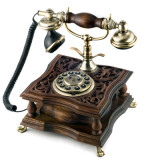If you grew up in the 1970s, 80s or even 90s, you’ll remember how hard it could be to have a private phone call. Plenty of households had just one phone with a cord, which made it nearly impossible to avoid eavesdropping siblings and parents. Of course, we all know what happened to landlines when cell phone technology became mainstream: Even a couple of years ago more than half of American homes had already ditched them, a number that has certainly increased by now.A similar extinction awaits traditional checking accounts. Why? The same sort of disruption that pulled the cord on millions of landlines is already underway in the world of personal finance, thanks to the rapid emergence and improvement of prepaid debit cards. The numbers alone show that checking accounts have already begun their walk into history. Indeed, between 2009 and 2012, prepaid card transactions grew at an annual rate of over 33 percent, with the total number of transactions reaching 3.1 billion in 2012 alone. Fitch Ratings recently declared that the rise of prepaid card transactions is likely to continue.There are a number of reasons to believe that Fitch is right and all of those reasons are very bad news for checking accounts. In part, the reason prepaid debit cards will make checking accounts obsolete is because the accounts themselves have become less and less attractive. Long gone are the days when checking accounts could be counted on to be gratis. In fact, 41 percent of banks say they will not offer free checking this year, an uptick of 8 percent since just last year. To be fair, banks are choosing to add fees in response to federal legislation that reduced what they could charge for regular debit card transactions and left a big hole in their revenue.But an even bigger reason the days of checking accounts are numbered is significant improvements in prepaid debit cards themselves. Long the last resort of people who couldn’t obtain bank accounts or credit cards – the so-called “unbanked” – prepaid debit cards were layered with outrageous fees. Some prepaid cards are still very bad deals (especially those with celebrity names on them) but the influx of cards from large financial institutions like American Express have vastly improved the consumer friendliness of these products. In fact, earlier this month the Pew Charitable Trusts released a study that found that many prepaid cards are more affordable than checking accounts.Besides the fact that checking accounts can no longer be counted on to be free, prepaid cards increasingly offer other features consumers find attractive. Since you can only spend money that’s already in a prepaid account, it’s impossible to either bust your budget or incur hefty overdraft charges. According to Shane Tripcony of BestPrepaidDebitCards.com, “The most common statement I get from current prepaid cardholders is their appreciation for that fact that they no longer get hit by overdraft fees with their card. It keeps their spending in check and does not allow for unplanned-for expenses. Some prepaid debit cards allow users to tap into a fee-free nationwide ATM network and others permit cardholders to write checks. “The bill paying and check writing capabilities without the threat of overdraft charges is what really helps prepaid cardholders,” said Tripcony.
Wireless provider T-Mobile can see the writing on the wall for checking accounts. In January the communications company jumped into financial services with the launch of Mobile Money a combination prepaid debit card, money management app and nationwide ATM network. For T-Mobile customers (non-customers can be subject to more fees), Mobile Money can be a basically free replacement for a no longer free checking account. And in a way, isn’t it appropriate that a cell phone company is helping to hasten the demise of a dinosaur every bit as obsolete as a landline?
Originally posted on TheDollarStretcher.com
